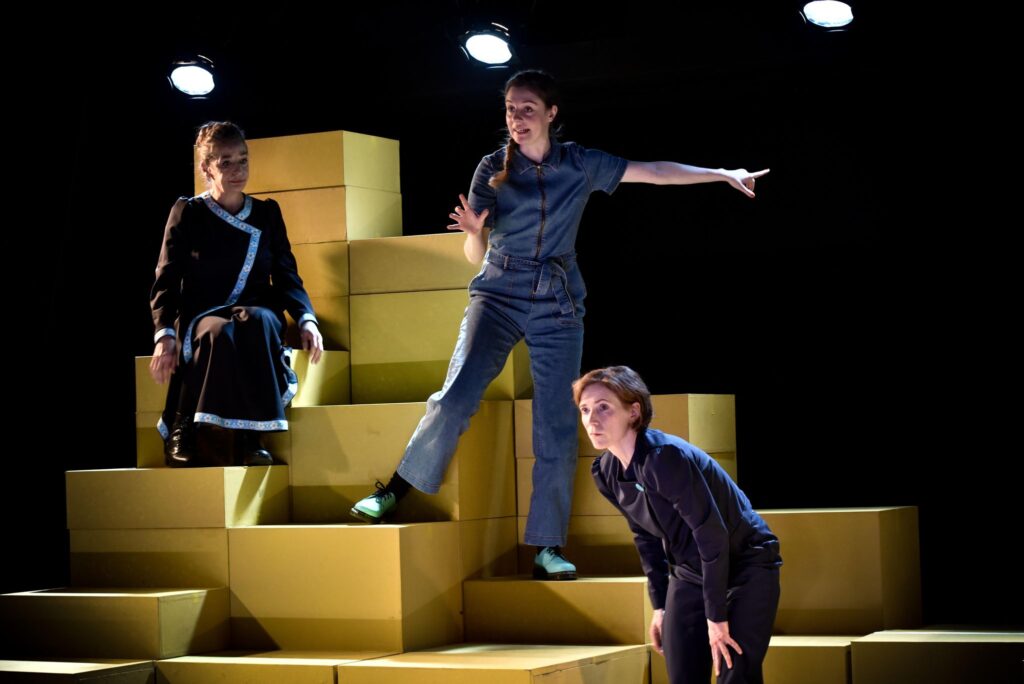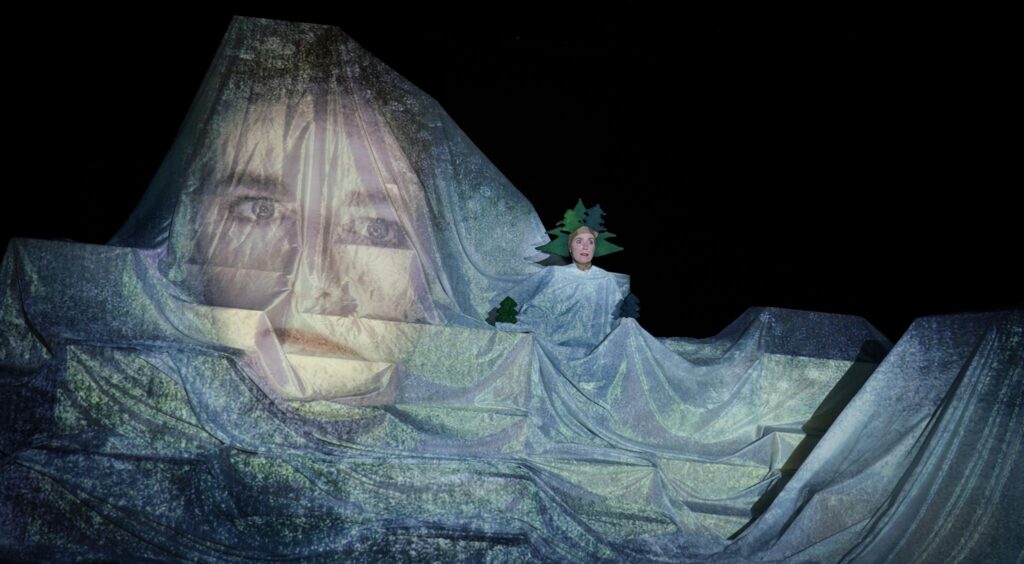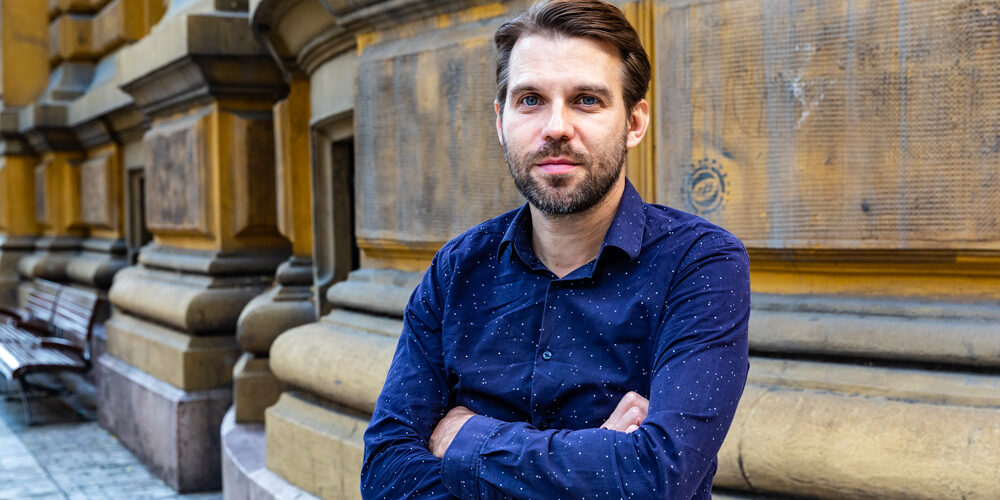The director Andras Dömötör talks to Tom Mustroph about his new production of Karpatenflecken, for Deutsches Theater, the need to reclaim the concept of nationality from the nationalists and whether it is possible to have true freedom of artistic expression in Orban’s Hungary
Though these days the Hungarian director Andras Dömötör works a lot in Austria and Germany, he has maintained working relationships with theatres in Budapest. His recent productions include Sirenengesang by Péter Nádas, Die Pest by Albert Camus and Märtyrer by Marius von Mayenburg. He’s currently working at Deutsches Theater in Berlin, where he’s directing the play Karpatenflecken (The Carpathians) by the young Romanian-born Austrian dramatist Thomas Perle, a play about heritage, identity, and nationalities.
Tom Mustroph: What sparked your interest in Karpatenflecken?
Andras Dömötör: The play is based on the biography of Thomas Perle. He comes from a Zipser German family (a German minority in Romania) that went from Austria to the Carpathians to Transylvania in the 18th century.
In the play there are three generations. The grandmother identifies as German and marries a Romanian man. The daughter marries a Hungarian. So the grandchild is a Romanian-Hungarian-German or German-Romanian-Hungarian or Hungarian-German-Romanian. I don’t know what’s the right word. Then the family returns to Germany. It’s like a circle from the 18th century to the end of the 20th century that ends in 1989 with the Romanian revolution. In the first weeks of freedom the family decides to move to Germany. All of this we understand from the perspective of the of the grandchild, who is basically an alter ego of Thomas Perle. It is [an attempt] to understand his family roots. I think this is very important to find out who we are and what our identity is from a historical perspective.
TM: This is a tricky topic because nationalists employ concepts like nation, nationality and identity to stir up tension and conflicts.
AD: Yes, that is true. And because of this we need to understand what these phenomena mean to us. We cannot deny that they exist and pretend that they are in the past. This play offers a new perspective: to understand that we are all mixtures of ethnicities so that a clear national identity looses its relevance. Because we cannot get rid of our nationalities.
TM: Even though it is sometimes not easy to confront ourselves with it?
AD: Yes. And with this comes another layer, that these nationalities or nations are often in conflict with each other. It is not so well known in Germany, but because of the history after the First World War there was always – and there still is – a political conflict between Romania and Hungary. With the grandchild, who is partly Hungarian and partly Romanian, this is already a conflict within the character. What the play is about is how we deal with these conflicts. And when we look to the nationalists and the Identitarians, I think it’s good to steal back the question of [how we] think about nationalities and nations.

Karpatenflecken at Deutsches Theater, Berlin
TM: What do you mean by ‘steal back’ nationality?
AD: I never used to think about whether I’m a Hungarian or not. But then [under] this political system that we’ve been faced with for 11 years in Hungary, I realize that they’re using the term “Hungarian” as a phenomenon to tear apart a country. This is something I thought was mine though it was as obvious as breathing and had no relevance. But now it’s been stolen from me because I’m suddenly an enemy. At first, I denied that I was a Hungarian or I tried not to think about the question, but it’s still my language, my culture. So I needed to find a new frame for these words for myself: what is it to be Hungarian? I like to steal back these words and polish them and give them a new interpretation so that I can move on.
TM: That is not only the case in Hungary. There are nationalist movements everywhere, both in Europe and outside Europe, and they exploit a lot of words and contexts.
AD: Yes, it’s the same with the word ‘family’ in Hungary, which is used now in the context of a heterosexual family of white people. Although I’m heterosexual myself and do believe in the institution of marriage, I need to clean this. When I say family or marriage. it’s not the same kind of family or marriage they are thinking of.
TM: This is a hard task. One has to ‘steal back’ or asterisk a lot of words?
AD: Yes, it’s huge work. But language is important because this is what we all use. It’s our tool for thinking. We need these words. Otherwise, we should just give up speaking. Therefore we need to steal them back.
TM: You recently did Figaro3 in Budapest, a mixture of three operas by Rossini, Mozart and Mihaud. Do you often return to Budapest to work?
AD: I have had five productions in seven years there and approximately three times as much work in Germany, Austria and Switzerland. I don’t really work there. What I try to do is not lose my connection with Budapest and Hungary. But it’s not my base as an artist.
TM: Do you work differently when you are in Budapest or Vienna or Berlin?
AD: No. I think that the theatre ensembles I work with, be it in Budapest or Vienna or Berlin, are more similar than they are different. The two theaters and their ensembles in Budapest that I currently work with are free ensembles. There is artistic freedom there. But these are islands of freedom only. The remains of a great theatre culture. I remember when I graduated as a theatre director, I could think of a lot of theatres all over Hungary that I could go to and work. And now it’s a very small number, mostly in Budapest. The intendants were removed in the last few years and there’s a very clear cultural strategy with this government. Though there is no direct censorship and you can work freely in certain theatres, the number of these theatres and these platforms is really limited. And there’s also no real perspective, so you can’t plan, you can’t imagine your future in two years or five years.
TM: Because you do not know whether the artistic director will be there in two years or the money will be there?
AD: Exactly.
TM: At the moment you have the Katona Joszef Theatre as a partner?
AD: Yes, the good thing there is that the money comes not directly from the state but from the city. And Budapest has a Green mayor. As long as he’s there, these theatres are protected. The situation is dark but not completely dark. There’s still a certain freedom. My problem is that it is exactly as much freedom as the government allows. There is no real freedom. They have the strategically important institutions like the National Theatre, the university and the big festivals under their control. And, in the meantime, the prestige in the society of former big houses like Katona is much less now. To compare it to Germany: It would be as if the Deutsches Theater can still work, but its publicity disappears. And the Theatertreffen (the biggest German national festival) is given to the AfD (the far-right party in Germany) and furthermore there’s no chance that Deutsches Theater is invited to the Theatertreffen. And one could continue with this picture: the Gorki is still free but the Berliner Ensemble and the Schaubühne and the Volksbühne starts to follow a new political direction just as universities like the Ernst Busch are now in the hands of the culture government. So freedom is really limited. It does not really look like freedom from outside, though you can freely work in certain houses.

Karpatenflecken at Deutsches Theater, Berlin
TM: Do you have a production company like other directors from Budapest? Like Arpad Schilling had with Kretakör or like Kornel Mundruzco with Proton theatre?
AD: I had that, but only shortly. When I first started to work in big houses with professional ensembles in Hungary I felt that it would be good also to do my own things, and I started to work with this little ensemble. We made some productions, the last one in 2011. But it’s not really my way.
TM: Why not?
AD: Because of the very simple problem that we needed someone who organizes everything. My experience was that I put all my energies into organizing and I felt that I could not work artistically with this ensemble. We also had no real financial backing.
TM: Could you imagine giving classes at the Budapest University for the Arts now, knowing it in the hands of the Orban government?
AD: No, definitely not. What happened with the university is pure crime.
TM: There was, at least in Vienna, if not so much in Berlin, a discussion about what effect it has to be invited to official theatre festivals in Hungary. Is it good for the audiences to have different experiences or does it mainly bolster the international reputation of the cultural policy of the Orban government. Should western ensembles take up these invitations or not?
AD: (pauses) This is a very big question. [I’ve been asked it before] and I always have a different answer. From my personal perspective I would say: “No.” If I was watching theatre in Budapest I would say: “Yes.” And when Burgtheater went, it was with The Seagull, and after that they read a petition against the system. I think that was a really good solution. The best way is probably to go, but to make it very clear, immediately, at the moment of the invitation, that they are going to read a petition, that they are [gong there] for the Hungarian audience and not to legitimise the system.
[pauses again]
Sorry, can I change my first answer? Actually now I think they should go there, definitely. It is important. I remember when I first saw a performance of the Thalia Theater in Budapest. I’d never seen anything like that before, only on video or DVD and I think it’s very important that Hungarian audiences have the opportunity to have this experience too.
TM: Looking at the titles of the plays you have directed, one might guess that you have not been labelled as the angry East European artist who shouts at the western audience about the problems back home. How did you avoid that trap?
AD: You are right. I don’t feel that I am an East European guy who needs to sell the ‘East European Horror.’ For me, it is good that I am very much interested in contemporary plays. I have done a lot of premieres, mostly of new German texts. But on the other hand, I definitely feel that I have had certain experiences that came from the fact that I’m from Budapest.
Karpatenflecken is being performed at Deutches Theater, Berlin
Tom Mustroph works in Berlin and Palermo as a freelance journalist and dramaturg. He operates in several journalistic fields, such as theatre, fine arts and sports. He is most interested in how self-responsible work can succeed elegantly and in accordance to minimal moral standards. He collaborates with several German language publications such as taz, FAZ, Neues Deutschland, NZZ, Theater der Zeit, zeit online, Deutschlandfunk and WDR.








